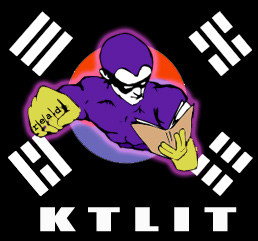Finally got back to the Wikipedia Project and added Kang Gyeong-ae to the Korean novelists page and created the page to link to. That page looks a little like this:
Kang Kyeong-ae
| Kang Gyeong-ae | |
|---|---|
| Born | April 20, 1907 (1907-04-20) (age 104) |
| Occupation | Novelist |
| Nationality | South Korea |
| Period | 1907-1944 |
Kang Gyeong-ae (born 20 April 1907) (Hangul: 강) is a South Korean writer.
Contents |
Life
Kang Gyeong-ae was born in Songhwa, Hwanghae-do, and had an unhappy childhood.[1] She was the daughter of a servant, fatherless by five years of age, forced to moved to Changyeon where her mother married a man with three children, all of which resulted in substantial unhappiness. [2]
Kang was something of a prodigy, reading the Tale of Ch’unhyang by age eight and beginning to learn the Korean alphabet at a time in which literacy was not valued for females. By age ten she had been nicknamed the “little acorn storyteller”[3] by neighborhood elders for whom she read traditional Korean tales.[4] She was a literary success as well, praised in school for her essay writing and writing and reading fictions for her friends. [5]
Kang was a rebel who enrolled in a Catholic boarding school from which she was expelled for participating in a sit-in. She met a college student who was visiting from Tokyo, moved to Seoul with him, and began an affair. When the affair failed, she moved back to her family in Hwanghae-do. [6]
In 1931 Kang began publishing her writing (“P’ag ŭm” or Broken Zither, 19310[7]), and moved to Manchuria as a newlywed, married to a communist who divorced his first wife. She lived as a housewife in Yongjin and began to churn out work. This period lasted seven years after which Kang ceased writing fiction altogether. [8] This was partly related to the fact that she became the managing editor of the Manchurian Chosun Ilbo.[9]
On April 26, 1944, one month after her mother died[10], Kang Kyŏng-ae died at her home in Hwanghae Province.
Work
Kang is often mentioned by literary critics as one of the extraordinary female writers of the colonial period. [11] She produced works focusing on the Korean underclass often based on her experiences with extremely poor Koreans in Manchuria, where many of her works are sited. These include[12]: The Broken Geomungo (Pageum), Vegetable Garden (Chaejeon), Football Game (Chukgu jeon), and Mother and Child (Moja). She also wrote proto-feminist works focusing on women’s oppression including Mothers and Daughters (Eomeoni wa ttal). [13] Most of her works are anti-love/anti family, in which only those women who cut their ties with their failed relationships can achieve freedom. [14]
The Human Problem (Ingan munje), which many consider her best work, deals with a multiplicity of class and gender issues in its story of an educated man troubled by economic struggles who ultimately meets a sad death. [15]
Works in English
On Wonso Pond ISBN 978-1558616011
Works in Korean (Partial)
The Broken Geomungo (Pageum)
Vegetable Garden (Chaejeon)
Football Game (Chukgu jeon)
Mother and Child (Moja)
Mothers and Daughters (Eomeoni wa ttal)
The Human Problem (Ingan munje)
Salt (Sogom 1934)
References
- ^ Korean Literature Translation Institute:
- ^ Feminist Press:
- ^ Feminist Press:
- ^ Feminist Press:
- ^ Feminist Press:
- ^ Feminist Press:
- ^ A History of Korean Literature. Peter H. Lee – editor. Publisher: Cambridge University Press. Cambridge, England. 2003. Page Number: 412.
- ^ Feminist Press:
- ^ Korean Literature Translation Institute:
- ^ Feminist Press:
- ^ A History of Korean Literature. Peter H. Lee – editor. Publisher: Cambridge University Press. Cambridge, England. 2003. Page Number: 412.
- ^ A History of Korean Literature. Peter H. Lee – editor. Publisher: Cambridge University Press. Cambridge, England. 2003. Page Number: 412.
- ^ Korean Literature Translation Institute:
- ^ A History of Korean Literature. Peter H. Lee – editor. Publisher: Cambridge University Press. Cambridge, England. 2003. Page Number: 412.
- ^ Korean Literature Translation Institute:



